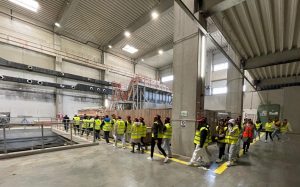Emilia Stroe, HR Director, Sphera Group: Curiosity is the first manifested characteristic of a leader in 2025; The power of example nourishes the context of the team

Outsourcing Today, the business services industry’s community networking and news integrated platform, resumes the series of interviews dedicated to evolution, expectations and opportunities in business services and related industries.
We invite business leaders, managers of strategic departments of companies, key voices in their field to share with us their insights depicting the new beginning of this year in business, how it looks, how it is anticipated, what adjustments are included in 2025’s agenda and the perspective of growth.
Find the full series of interviews here
We spoke recently with Emilia Stroe, HR Director at Sphera Group about the business evolution, trends and expectations of growth.
Find below the insights:
Strategic Vision of HR and Market Trends
What are the key HR trends you believe will shape your industry in 2025?
Business growth today resembles a marathon rather than a sprint as it once was. To support a marathon, we need resources, and we need to be resilient, curious and creative. Companies need to train their employees to create sustainable and long-lasting business facets. Each manager needs to become aware of their contribution, as they are the trainers/coaches/mentors and guides for their teams’ future. This supports the trend of continuous learning and through that, continuously adapting to the external context and the internal needs & expectations.
We also see a transformation of the labor market – the line between the fields of action becomes invisible, and people move quickly from one industry to another.
But we face challenging times. In 2025, Romania entered the UN list of super-aged societies, meaning that more than 20% of the population is over 65 years old. The unemployment rate for people under 24 has risen to 27%, while that of young women is over 28%. Unemployment among people with low levels of education is 7 times higher. The NEET (people aged 15 to 24 not in Employment either in Education or Training) rate signals difficulties in transitioning from the educational system to the labor market. If our society does not act today to redefine work for the unemployed and uneducated, and to reconfigure the equation between work & reward, we can anticipate even greater labor shortages in the next ten years. How Romanian authorities would respond to these challenges could significantly impact business operations and strategic decision-making in the next years.
A new trend should be to consistently engage in constructive, forward-looking dialogue to identify solutions focused on making a positive impact on our context. The way we choose to collaborate today will shape how we achieve results, impact others and create future opportunities.
As you might see, people’s behaviors and intentions play a critical role in shaping trends.
At Sphera Group, we regularly discuss these trends and focus on ensuring that all our projects create opportunities for growth for both our people and the business.
What major adjustments in HR should a business consider this year, in the context of local market competition and worldwide challenges?
We are all players in this marathon. And, as we know, the main features of a marathon are:
Distance: From an HR perspective, supporting a marathon distance requires us to consider both the physical and metaphorical distance between our businesses and their candidates. Both parties should adjust the needs and expectations. Sphera Group invites all candidates to join, even without prior professional experience. We value employees who are willing to work, learn and grow with the goal of reaching their fullest potential.
History: In Ancient Greece, the marathon began with an announcement of victory. The success of a business lies in its stakeholders being delighted by the results. From an HR perspective, its success also hinges on viewing its employees as investors of energy, effort, emotions and capabilities. At Sphera Group, we take pride in having colleagues with 20 years and 30 years of experience, which gives us confidence that we are successful in retaining our investors.
Setting: Similar to a marathon, where participants navigate loops, out-and-back routes, or multiple laps, businesses must adapt their strategies to meet current challenges. This rethinking includes HR processes such as recruitment and talent acquisition, talent retention, training & development, employee engagement, technology and AI. Sphera Group’s ability to adapt is visible not only through the complexity it created in its field of business, but also the diversity of brands and people.
Pacing: Optimal pacing strategies are critical in a marathon, just like in a business. From an HR perspective, a business ‘pacing strategy’ – how it allocates work, skills and energy across tasks/projects/initiatives- can significantly impact overall performance. At Sphera Group, we create opportunities for people to develop their competencies in line with their position and expected contribution.
What leadership aspects are important in 2025?
Curiosity is the first manifested characteristic of the 2025 leader. It must be an inner and outer exercise, as the leader is the first person in the team who sets the tone. The power of example nourishes the context of the team.
Courage is also needed due to frequent changes and challenges. Leaders should be brave enough to put themselves through one of the toughest challenges: to lead the team uncertainty, fostering a context of psychological safety and inspiration.
Resilience arises as a natural feature for a curious and brave leader, as not everything will run smoothly, and their team often faces hurdles. Using collective intelligence might be valuable for the leader, to catch all the perspectives he cannot have by himself.
All these should be supported by a hardy personality that encompasses commitment and control, as well as a challenge and business-focus approach.
People and Sustainability
What steps is your company taking to align with the sustainability goals in terms of people in 2025?
Sustainability has been an important topic for Sphera Group, especially since we are listed on the Bucharest Stock Exchange, and this gives us a major responsibility to be an example for the Horeca industry.
Not only do we comply with mandatory reporting, including EU’s new directive on sustainability, CSRD, but we turn compliance into opportunities. We are moving away from isolated sustainability initiatives, and we focus on scaling transformative, high-impact solutions, linking financials with people with the environment and with governance.
Regarding social aspects, we focus on integrating sustainability into our organizational culture. One of our first decisions has been to enhance leadership capabilities that drive meaningful progress in sustainability efforts. People can contribute effectively when they understand how to do so and what the targeted outcomes are. We periodically monitor the employee engagement index and the women happiness index, which contributes to a positive dialogue among all parties involved. We support diversity, equity, inclusion and belonging as we have many colleagues with different nationalities, for example. Our partnerships on social topics provide us with strength and inspiration to positively influence people’s lives. We collaborate with NGOs focused on sustainability, supporting employees to participate in local initiatives and projects.
How do you engage people in your teams to ensure long-term sustainability in your operations?
The concept of long-term sustainability is applicable not only in operations but also in relations – and that is the beauty of sustainability.
Sphera Group started with creating a clear long-term goal of sustainability, as a transformative concept with multiple benefits for all stakeholders. Then, we realized the need to improve our sustainability knowledge and competence, so we offered the necessary training and resources to understand and champion sustainability. Leading by example was and still is another important aspect when it comes to sustainability in our Group. Each leader is expected to demonstrate commitment to sustainability within their context and team. People need to see/feel/listen before they follow, so it is crucial to have an example that sustainability is possible. How the leader encourages feedback, and innovation represents an opportunity to voice employees’ ideas and concerns on sustainability impact.
Of course, like any other change, sustainability needs to be consistently reinforced and championed.
Innovation and Digital Transformation in HR
What role does innovation and technology play in the company’s HR strategy for this year? In what kind of HR aspects should be more integrated?
Innovation & technology play pivotal roles in Sphera Group’s HR strategy, being present in almost every HR process. Our recruitment process based on innovation & technology enables us to be fast, comprehensive, and close to our candidates. We implemented a personalized HR self-service approach, by providing our managers with personalized dashboards and quick and predictive responses.
We integrated innovation & technology into our training and development initiatives, using learning management systems to create different learning opportunities on various topics either at a defined learning pace or at each employee’s learning speed.
The way we understand the value of innovation & technology in HR activity and how we work together are good predictive signs for success and inexhaustible sources of resource savings and investments.













